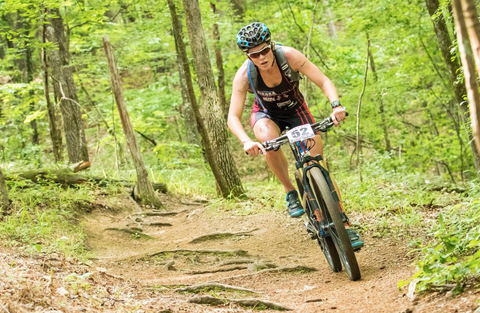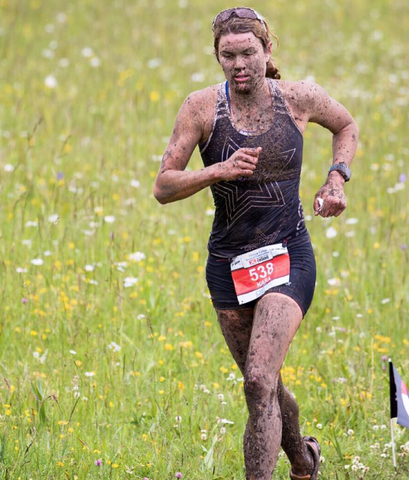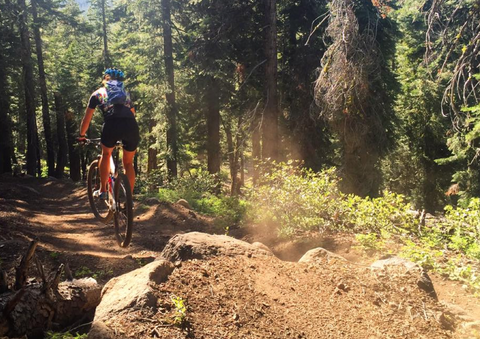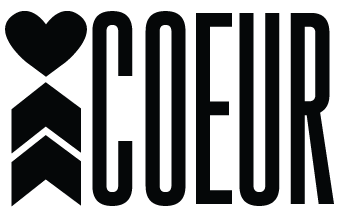Coeur Sports provide Women's Triathlon Clothing, Women's Cycling Shorts, Jerseys and Run Gear.
Sponsored Athlete Profile
She’s cool, thoughtful, and tough as nails. Today, we’re chatting with Coeur sponsored professional mountain biker and triathlete – Kara Lapoint.

Coeur: Hi Kara. Thank you so much for taking time to chat with us today. Please share a bit about yourself and your background as an athlete.
Kara: Hello! Of course, it’s an honor to chat with Coeur, and thank you so much for thinking of me. I have been an athlete in some form or another my whole life. I was born and raised in Truckee, CA (where I currently live), so I pretty much grew up playing outside, with all sorts of adventures right out my back door. Exploring the mountains was my entertainment, and I’m thankful everyday that I grew up with a lifestyle that enabled me to develop such a deep passion for sport and an endless appreciation for the outdoors. In my opinion, the time I spent outside as a kid running, biking, skiing, hiking and just playing in nature taught me more about life and myself than any classroom ever could.
Naturally I was more drawn to endurance sports, and I always loved the feeling of pushing myself to go further and faster, both in racing and in training. I started competing in swimming when I was about 8 years old and did that year-round for many years, but in middle school I began cross-country skiing and that quickly became my biggest passion, with swimming becoming just a spring season sport. I trained year-round for skiing through high school, and became a top competitor at junior nationals each year. I went on to ski collegiately in the NCAA Division I, and was part of a team that won the NCAA Championship title (my freshman year at the University of Denver). I ended up transferring to the University of Nevada and after my final year of skiing I did a year of cross country running and track there as well.
After I graduated, I continued skiing for another year, and started doing some longer-distance running races, especially half marathons. The next summer I went on a trip to Europe and just happened to stumble across a triathlon in Spain. I thought it was so cool, and immediately knew I wanted to try it out. When I got home, I found a late-season Olympic distance race nearby and jumped in. While it was one of the hardest things I’d ever done, I was totally hooked and my passion for triathlon has only grown with each race and season since then as I continue to evolve as an athlete.
Coeur: You seem to have a passion for Xterra racing and Mountain biking. Can you tell us why those disciplines resonate with you?
Kara: Absolutely! I think a lot of it goes back to those early years and the perspective I developed through my athletic experiences growing up, which remains unchanged today. I like to have fun, and for me sport is ultimately an avenue to find adventure, to explore and to see the world in a whole new way. Over the past few years I've found myself more and more drawn to the off-road disciplines, as they help me stay connected with the things I love most about being an athlete. I love that mountain biking and trail running can take me to so many incredible, wild places and provide such a great escape from the "ordinary.”
With respect to Xterra, I love how the races provide so much variety. Every experience is so vastly different from the next, and each course features totally unique aspects and challenges. Xterra races put athletes to the test in so many different ways, and I just find the races to be such an authentic, gritty experience that really promotes personal growth. In many ways it’s about pushing yourself against the course and the elements, but it’s also an intense, fast-paced and constantly engaging race against your competitors that often comes down to small margins, critical segments and is ultimately a battle from start to finish every time. I do still very much love road triathlon and appreciate all it has to offer and the gains it provides me as a racer, but as I’ve fallen more and more in love with Xterra over the years, it has become my primary focus.

As far as mountain biking, I love the challenge. It’s probably the most dynamic sport I’ve ever experienced, where the terrain is constantly changing and there is always a new challenge to overcome. For me the skill aspect of mountain biking has really become a personal conquest, as I’m continually pushing myself to “go bigger,” try new things, master different techniques and ultimately face a lot of obstacles that really scare me. This is difficult, and certainly something that requires a lot of heart and courage, but when you finally conquer something that has been plaguing you, it’s truly one of the most rewarding feelings out there and inspires a lot of confidence to keep moving forward and progressing.
Coeur: We’re over half way through 2016. How has the year been going for you?
Kara: Yes, I can hardly believe it’s already almost September! This season has flown by for me more than ever before. It’s been a very busy year with lots of racing, but it’s been a really great one so far. This season I decided to really take advantage of the opportunity to see the world through racing, and I’ve done more travel than ever before. So far in 2016 I’ve competed in: Southern California, Costa Rica, Central California, Alabama, North Carolina, Switzerland, France, Colorado, right here at home in Truckee/Tahoe, and in the Dominican Republic — and still yet to come are Utah, Maui and Australia! It’s been a bit of a whirlwind, but an incredible adventure that has brought experiences I know I couldn’t attain any other way, and I’m extremely grateful.
As far as performance, this season has been pretty exceptional for me, and I couldn’t be more thankful for the way things have shaped up so far. As always there have been ups and downs and some unforeseen challenges, but all in all I have met my expectations, achieved the vast majority of my goals thus far, and produced some of the best results of my career. My primary focus this season has been the Xterra Pan-American tour, and that has gone very well, with three podium finishes so far (one 2nd and two 3rd place performances, in addition to a 6th place finish after getting a flat tire). I currently sit in 4th place overall heading into the Pan-American championship and final race of the series next month. While achieving these results has been rewarding, above all I am most excited by the amount of personal progress I've seen this season, as I believe that's the best way to judge my own “success.” My biggest and most important races are still yet to come, however, with the Pan-Am champs around the corner, followed by the Xterra World Championship in October and the ITU Cross Triathlon World Championship in November.
Coeur: We believe this is your third full year as a professional. Has the journey been different than what you expected? If so, how?
Kara: Yep, that’s correct, this is my 3rd year racing pro in triathlon (though it is my first year racing as a UCI elite/pro in mountain biking). It’s hard to believe it’s already year three, as sometimes I still feel like such a rookie! All in all the journey has been pretty similar to what I anticipated, except even more fun and rewarding. I knew that making the step up to pro racing would be extremely challenging and it certainly has lived up to that expectation, but that was exactly the reason I wanted to do it. I am someone who really believes in the value of pushing yourself and racing among people who are going to make you really strive to improve. Honestly I don’t think I personally get a lot of long-term benefit out of winning races or getting on the podium every time… I know this is different for everyone and some people really thrive in being at the top, but for me I learn and gain so much more by challenging myself to the max and immersing myself among the best possible competition out there, even if it means I end up at the back of the pack sometimes.
Fortunately I am really able to embrace the experience of being an “underdog” and I like having a big goal in front of me to work toward and a lot of room to grow, and maintaining that attitude has been crucial over these past three years. I certainly still have a whole lot of work to do before I can really compete against some of the top women out there in each discipline, but I’m continuing to make small steps, focusing on my progress and enjoying the journey. I think the most critical thing is to be able to keep it all in perspective – understanding there is no such thing as “overnight success” and not getting too caught up in the results, but being willing to put in the consistent work, stay patient through the process and also to really be able to stay positive in focusing on your own journey and goals, and to never, ever stop believing in yourself.
Coeur: Is training for an Xterra race significantly different than training for a road triathlon?
Kara: While there are a lot of similarities in training for road and off-road triathlons, there are certainly some pretty key differences too. Obviously the biggest difference between the two types of racing is the bike, and ultimately this is where off-road athletes have to be the most specific in their training. To start there is the technical aspect of mountain biking that comes in to play in a big way with Xterra racing, and that certainly requires a lot of very specific focus and practice. But the differences between the two bike legs extend well beyond that, and as someone who competes in both I’m always surprised by just how unique they feel. Mountain biking requires the ability to respond very quickly to rapid and distinct changes in terrain, which means there’s a lot of fluctuation in speed and intensity throughout the race, and it’s crucial for riders to be familiar with making those changes and to know when it’s appropriate to push and when to back off. Likewise, because the riding is so dynamic, riders have to be comfortable accelerating over their threshold, recovering quickly and then accelerating again, numerous times during a race. In my experience this is very different from long-distance road triathlon, where it is all about settling in to a specific pace and power output, and maintaining that as consistently as possible through the duration of the ride. For me this is actually a lot more challenging because I don’t train for it as much, and really it is so specific in itself. But for those who are more used to road racing, the dynamics of mountain biking can be really tough to figure out. In addition, Xterra allows drafting, so that brings in a whole other tactical dimension that is very different from long-distance road triathlon.
For the most part, swim training is the same, although in my experience I have seen more variable conditions in the Xterra swims, where the “rough water” idea is well embraced! (At the last stop in Dominican Republic we swam in 10-12 foot ocean swells!). The run is also very different from road racing, much in the same way as the bike. It’s trail running, so there’s just not the same consistency that there is on the road, and you really can’t focus on or worry about pace. The courses tend to be much hillier, and there are often obstacles to pass over/under or rough terrain to deal with. As on the bike, you just have to be able to respond to the many quick changes of the course and capitalize on them the best you can.

Coeur: At Coeur, we love supporting our professional athletes, but we know we’re small and that racing around the world is expensive. What can be done to increase the visibility and earning power of professional triathletes?
Kara: Great question! First off, let me say how much we athletes do appreciate all the support we receive from Coeur. As a small company, I know how challenging it must be to provide support at any level and the way Coeur has made that a priority really speaks volumes about your commitment to helping athletes achieve their goals and fostering growth of the sport. Not to mention, the community that Coeur has provided to its team members is absolutely invaluable.
But yes, the costs of racing are extremely high, the earning power is relatively low and it is generally just a huge challenge to actually make a living as a professional triathlete. I think this is a real shame, because I believe there’s a lot of value and inspiration in the notion of chasing after your dreams and really following your passion. That being said, I do think there’s a lot more that can be done to help increase visibility for professional triathletes, and much of it comes down to thinking outside the box and looking at the “big picture.” I think so often in sport the focus gets too exclusively placed on results, from all sides (athletes, sponsors/supporters and fans), and to be honest I just don’t think that’s the most valuable thing that athletes have to offer. Likewise, I don’t think the results are what most people really care about at the end of the day… More so they care about people who are contributing to the athletic community beyond the racecourse, and in unique ways -- or at least this is my perception! I think it’s important for athletes to find other ways to contribute and make an impact, and likewise find other ways to market themselves and expand their reach. In that same vein, I think it’s even more important (and wise!) for companies to look at the full package when it comes to partnering with athletes. Yes, podiums are nice, but they are ultimately such a small part of an athlete’s potential to really make an impact and inspire others.
In my opinion, the athletes that really stand out aren’t doing so because they won their latest race. The bottom line is only one person can win a race on any given day, and many athletes will never be that person, but that doesn’t mean they don’t still have a whole lot to offer. So athletes have to think about how else they can contribute, and what other avenues and tools they can utilize to make their mark on triathlon. And this needs to be a collective effort. I hope more and more people will also continue to recognize athletes for their character and contribution, and think about what really is ‘valuable’ to them.
Coeur: In early 2016, you wrote a wonderful piece about body image that seemed to get some very positive attention. What prompted you to speak out?
Kara: Thanks so much for bringing this up. Yes, the article did receive a lot of really positive attention, which was extremely gratifying. As you can imagine it’s not always easy to put yourself out there and be really candid in the public sphere, but this is a subject I am extremely passionate about, so for me it was absolutely worth speaking out. Given the nature of endurance sports, particularly at the elite level, there’s a lot of talk out there about body types and what is the “ideal,” most “advantageous” etc. I think a lot of women hear that, or feel like they see it around them, and think they won’t be able to find success or fit in to the triathlon community because they don’t have the “right” body type. I’ve seen women absolutely beat themselves up about this or go to great lengths to try to change their bodies, and it just completely breaks my heart.
At 155 pounds I’m certainly heavier than the “average,” or what some might call the “ideal” for a professional triathlete, but I’ve come to realize this doesn’t mean I’m at a disadvantage or that I can’t achieve my goals. There have been times when I’ve doubted myself and thought maybe I needed to make changes to my body if I really wanted to be successful at the highest level, but I’ve realized that this is where my body wants to be. It is happy and healthy here, in its natural state, so why in the world would I try to change that…? Instead, I’ve worked to find ways to really embrace my body as it is and get the most from it; to maximize my strengths and find my own unique advantages. This is a great feeling, and I really wanted to try to help encourage and inspire other women to feel the same way… to love their bodies as they are and not feel the need to change them, and also to truly believe they can achieve their own goals with the body that they have today, regardless of how it compares to anyone else’s. I want people to know there is no one “right” body type, weight, height, etc. for our sport, that the “ideal” is in fact different for everyone, and that being healthy and happy in your own skin is truly what matters most – and also what will enable you to unlock your full potential and find your greatest success!
Coeur: Kara, thank you so much for being an advocate for health and fitness and good luck with the rest of the year!

